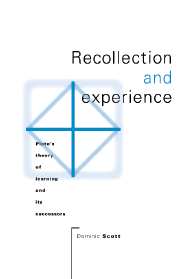Book contents
- Frontmatter
- Contents
- Acknowledgements
- Abbreviations
- GENERAL INTRODUCTION
- SECTION I PLATONIC RECOLLECTION
- SECTION II ARISTOTELIAN EXPERIENCE
- SECTION III HELLENISTIC CONCEPTS
- Introduction
- 7 Hellenistic philosophy and common sense
- 8 Innateness in the Hellenistic era
- INTERIM CONCLUSIONS
- SECTION IV INNATISM IN THE SEVENTEENTH CENTURY
- CONCLUSION
- Bibliography
- Index of ancient passages
- General index
7 - Hellenistic philosophy and common sense
Published online by Cambridge University Press: 03 December 2009
- Frontmatter
- Contents
- Acknowledgements
- Abbreviations
- GENERAL INTRODUCTION
- SECTION I PLATONIC RECOLLECTION
- SECTION II ARISTOTELIAN EXPERIENCE
- SECTION III HELLENISTIC CONCEPTS
- Introduction
- 7 Hellenistic philosophy and common sense
- 8 Innateness in the Hellenistic era
- INTERIM CONCLUSIONS
- SECTION IV INNATISM IN THE SEVENTEENTH CENTURY
- CONCLUSION
- Bibliography
- Index of ancient passages
- General index
Summary
Both Epicurus and the Stoics thought we have natural concepts – prolepses or common notions – whose reliability and clarity acts as the touchstone of all inquiries. In the next chapter we shall ask whether either Epicurus or the Stoics thought that these concepts were, in any sense of the word, innate, or whether they were natural only in the sense of being derived from experience rather than teaching or tradition. In this chapter we shall focus on their attitude to common sense. Plato would have agreed that all of us possess such foundational knowledge; the problem is that it is buried deep in the soul, hidden beneath a layer of wax. Most people are thus quite unaware of the knowledge they possess. The Hellenistics, on the other hand, seem to hold that our criteria are manifest to everyone: how else could they appeal to universal consent as they seem to? So far, then, we seem to have an optimistic theory about nature giving us reliable concepts that are put to work throughout our lives. The problem is that both these philosophers can also be extremely critical of common sense. In other words, they start by showing an Aristotelian respect for our ordinary cognitive resources, and then offer an almost Platonic view about human propensity to error. The point of this chapter is to determine where these philosophers really stood on this issue.
EPICURUS
There are two reasons for thinking that Epicurus was a philosopher who felt obliged to tailor his theories to common sense. The first, as we have seen on pp. 162–3, comes from Cicero, N.D.
- Type
- Chapter
- Information
- Recollection and ExperiencePlato's Theory of Learning and its Successors, pp. 169 - 186Publisher: Cambridge University PressPrint publication year: 1995



